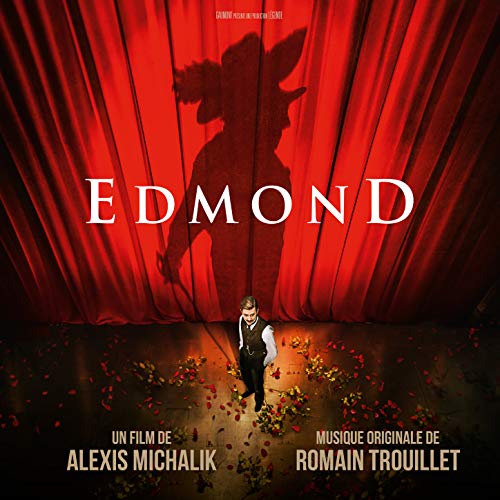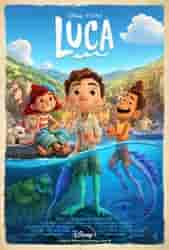

- #Luca soundtrack movie
- #Luca soundtrack tv
Animal Athlete Loophole: Ain't no rule that sea monsters can't win the race.Not because he lied to her, but because he and Alberto were putting their lives at risk when they chose Portorosso, a town known for hunting sea monsters, as a place to explore. Anger Born of Worry: After Giulia finds out that Luca is also a sea monster, she starts angrily ranting at him.When Luca asks what she'll do after that, she just shrugs and easily admits that the validation is all she really wants out of it. And Then What?: Downplayed - when sharing their goals for when they win the Portorosso Cup, Giulia says that she intends to proclaim to everyone who doubted her that she told them she'd win.And the Adventure Continues: The end credits contain drawings showing the continuing adventures of Luca, Alberto and Giulia.However, because of the song's acoustic arrangement, it blends in without difficulty. 1959-62) except for Edoardo Bennato's "Il gatto e la volpe" which was released in 1977.
#Luca soundtrack movie
Most of the real-life songs featured in the movie are accurate to the time period (ca.
Alternative Foreign Theme Song: The Japanese dub uses Yorushika voicalist suis's rendition of Yosui Inoue's song, "Shonen Jidai (Boyhood)". The main children's ages are only revealed in the script: Luca is 12, Alberto is 14, Giulia is 13, while Ercole is 18. Though the sisters' last name is Italian for "lobster", which fits with the other sea monsters' Animal Theme Naming. Several minor characters like Don Eugenio (the local priest) and the elderly sisters Concetta and Pinuccia Aragosta aren't named in the film itself and their names only appear in the credits. Hence why he was sent to the deep to cure his "addiction". Director Enrico Casarosa revealed Uncle Ugo's past on his Twitter, stating that Ugo wasn't so different from Luca and tried to explore the surface in the past, which almost got him killed. According a tweet of director Enrico Casarosa himself, he named Luca's grandmother after his own grandmother, Libera. Alien Hair: Luca and Alberto both have locks of curly hair in human form, but their sea monster form is shown to replace each lock with a fin. #Luca soundtrack tv
Advertising by Association: One TV spot announces "From the creators of Coco, Inside Out Toy Story." Another highlights Toy Story, Inside Out and Soul. Similarly, Uncle Ugo's appearance seems to indicate that if they live in deeper water, they change into something more biologically suited for such an environment, becoming translucent and developing anglerfish-like traits. They also seem to dry very quickly, in only seconds, allowing them to change fairly quickly, as long as nothing keeps wetting them down. Adaptive Ability: This seems to be a trait of sea monster biology, as it's shown their species automatically change to assume a human form when dry, right down to their tails disappearing. He gets slapped in the face via a sandwich for it. Actually Pretty Funny: Guido chuckles when Luca compares Ercole to a catfish.  After Giulia saves Alberto and Luca from Ercole, the latter screams: "Fine! Go start a club! For losers!" Jack Dylan Grazer, Alberto's voice actor, was known worldwide for being in the Losers' Club. When Uncle Ugo introduces himself to Luca, his failing heart causes him to freeze, cutting him off just as he says "very nice!". Though Luca is set in Italy during the late 1950s-1960s, composer Dan Romer and director Enrico Casarosa "wanted something that felt like more of a nod, or a memory, than something that felt historically accurate.
After Giulia saves Alberto and Luca from Ercole, the latter screams: "Fine! Go start a club! For losers!" Jack Dylan Grazer, Alberto's voice actor, was known worldwide for being in the Losers' Club. When Uncle Ugo introduces himself to Luca, his failing heart causes him to freeze, cutting him off just as he says "very nice!". Though Luca is set in Italy during the late 1950s-1960s, composer Dan Romer and director Enrico Casarosa "wanted something that felt like more of a nod, or a memory, than something that felt historically accurate. 

It's a delightful infusion of standard film scoring and the music that's been around for centuries and is synonymous with the locale all wrapped up and turned on its side a bit to incorporate the underwater fantasy elements of the film. The score also takes advantage of the film's location and infuses Italian musical elements one would traditionally find in a Puccini opera or played on the streets by buskers. But that doesn't mean the score is without charm and humor there are several thematic intense parts of the score that go along with the film's more cinematic moments, the best of which is the iconic Jaws theme, which the score reflects in a way that evokes the shark-themed blockbuster classic. The score is uplifting and hopeful, incorporating lots of floaty water-like strings and inquisitive pizzicato elements gives the score the same childlike wonder as the film's main character, Luca, discovering the world and exploring the land above him.








 0 kommentar(er)
0 kommentar(er)
